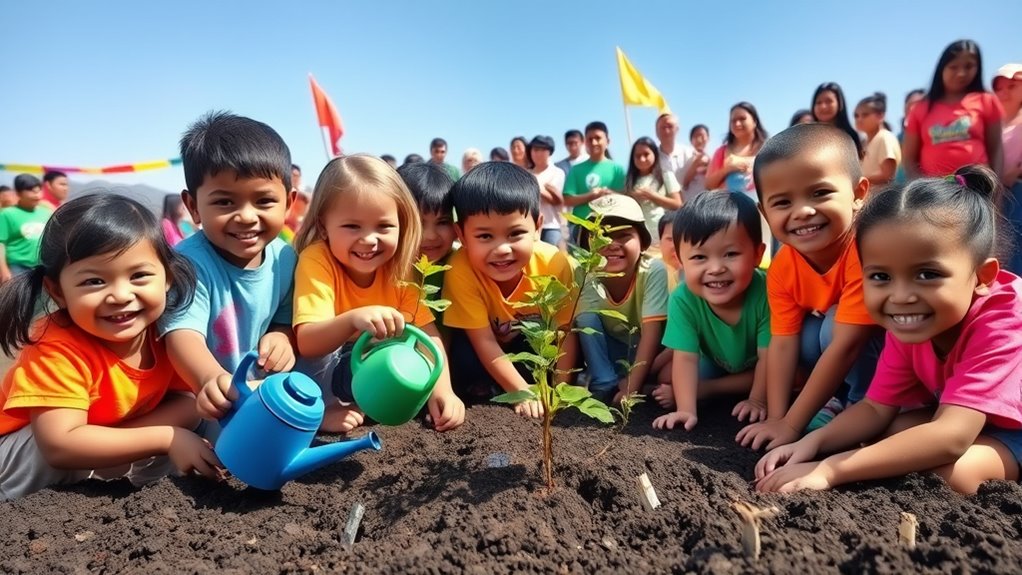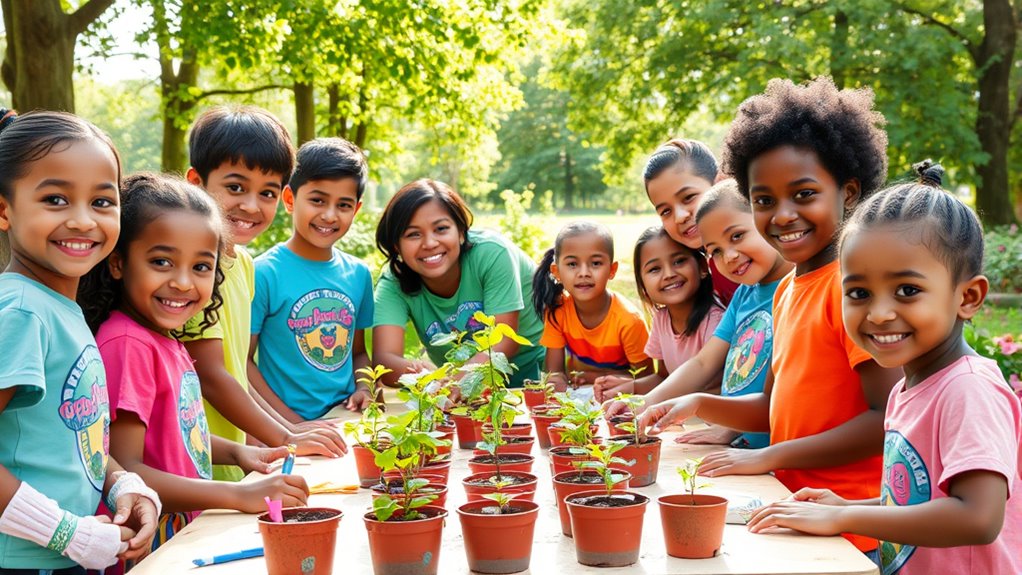Engaging kids in service projects helps them develop compassion, empathy, and a heart for missions by giving them meaningful ways to serve their community. Activities like volunteering at food banks, cleaning parks, and making cards for others teach patience, teamwork, and responsibility. These experiences boost confidence and foster lifelong values of kindness and social awareness. Continue exploring how these projects shape caring adults who are enthusiastic to make a difference in the world.
Key Takeaways
- Engaging kids in service projects fosters empathy and a lifelong commitment to social responsibility.
- Community activities like volunteering and cleanup teach children the value of giving back.
- Service projects develop skills such as leadership, teamwork, and problem-solving, shaping caring adults.
- Hands-on service experiences reinforce character traits like kindness, patience, and humility.
- Long-term involvement cultivates a heart for missions and a deeper understanding of community impact.

Are you looking for meaningful ways to teach kids about kindness and community? Engaging children in service projects is a powerful method to help them understand the importance of giving back. When kids participate in community service, they don’t just do good deeds—they grow in character and develop a sense of empathy that lasts a lifetime. These experiences allow children to see firsthand how their actions can positively impact others, fostering a heart for missions and a deeper understanding of social responsibility.
Getting kids involved in service projects encourages them to step outside their comfort zones and connect with people from diverse backgrounds. Whether it’s volunteering at a local food bank, cleaning up a park, or making cards for seniors, each activity teaches children about compassion and the value of helping others. As they participate regularly, they learn that kindness isn’t just an occasional act but a way of life. This consistent exposure to community service reinforces important lessons about patience, humility, and the importance of community, shaping their character in meaningful ways.
Encouraging kids to serve helps them grow in compassion, humility, and understanding of their community.
Involving children in service projects also helps them develop leadership skills and a sense of initiative. When they see the tangible results of their efforts, it boosts their confidence and inspires them to stay committed to serving others. Through these experiences, they understand that being part of a community means actively contributing to its well-being, not just passively observing. This active participation nurtures a sense of belonging and responsibility, essential qualities for future leaders who value service and integrity.
Furthermore, service projects are excellent opportunities to teach kids about teamwork and cooperation. Working together toward a common goal helps them see the importance of collaboration and respecting different perspectives. These lessons in teamwork are vital for character building, equipping children with skills that extend beyond the immediate project. As they learn to listen, share, and problem-solve with others, they develop a maturity that will benefit them in all areas of life.
Ultimately, by involving kids in community service, you’re not just giving them a chance to help—they’re learning lifelong values. These projects cultivate a heart for missions, instilling compassion, responsibility, and a desire to serve that shapes who they are as individuals. When children understand the significance of their actions and see the impact they can make, they grow into caring, empathetic adults ready to make a difference in the world. Additionally, understanding the role of contrast ratio in visual quality can help children appreciate the importance of details and clarity, even in projects like creating art or presentations.
Frequently Asked Questions
How Can I Involve Very Young Children in Service Projects?
You can involve very young children in service projects by crafting volunteer opportunities suited for their age, like simple donations or sharing handmade cards. This fosters empathy development as they learn to care for others. Keep activities short, engaging, and hands-on, so they stay interested and feel accomplished. Encourage their parents’ involvement to model kindness and guarantee safety, making service meaningful and enjoyable for your little ones.
What Are Age-Appropriate Service Activities for Preschoolers?
You can craft service ideas that are simple and engaging for preschoolers, focusing on age-appropriate volunteering. Activities like making thank-you cards, collecting food for a food bank, or planting flowers in a community garden teach kindness and teamwork. Research shows that young children thrive on hands-on, achievable tasks. By involving them in these small service projects, you cultivate a caring heart and introduce them to the joy of helping others early on.
How Do I Teach Kids About Cultural Sensitivity During Missions?
You teach kids about cultural sensitivity by emphasizing cultural awareness and respectful communication. Encourage them to ask questions, listen actively, and learn about different cultures through stories, music, and food. Model respectful behavior yourself, showing appreciation rather than stereotypes. Use simple language to explain that every culture is unique and valuable, helping kids develop empathy and understanding that fosters respectful interactions during missions.
How Can Service Projects Be Adapted for Children With Special Needs?
To adapt service projects for children with special needs, you can craft inclusive activities that cater to diverse abilities. Use adaptive strategies like visual aids, sensory-friendly tools, and flexible tasks to foster participation. By embracing empathy, encouragement, and patience, you create a caring, collaborative environment where every child feels involved and valued. This approach not only promotes inclusion but also cultivates compassion and community connection among all participants.
What Are Some Ways to Sustain Kids’ Interest in Missions Long-Term?
To keep kids interested in missions long-term, you should focus on faith reinforcement through regular discussions and prayer. Incorporate engaging stories and hands-on activities to deepen their connection. Volunteer mentoring plays a key role by providing encouragement and guidance. You can also create ongoing projects or clubs that allow kids to see their impact, helping them develop a lasting heart for missions and a desire to continue serving.
Conclusion
By involving kids in service projects, you’re planting seeds of compassion and shaping future mission-minded hearts. Remember, giving a little of your time can go a long way, and it’s never too early to teach kids the value of helping others. When you nurture their sense of purpose now, you’re setting them up for a lifetime of making a difference. After all, you’re helping them hit two birds with one stone—growing in kindness and faith simultaneously.










